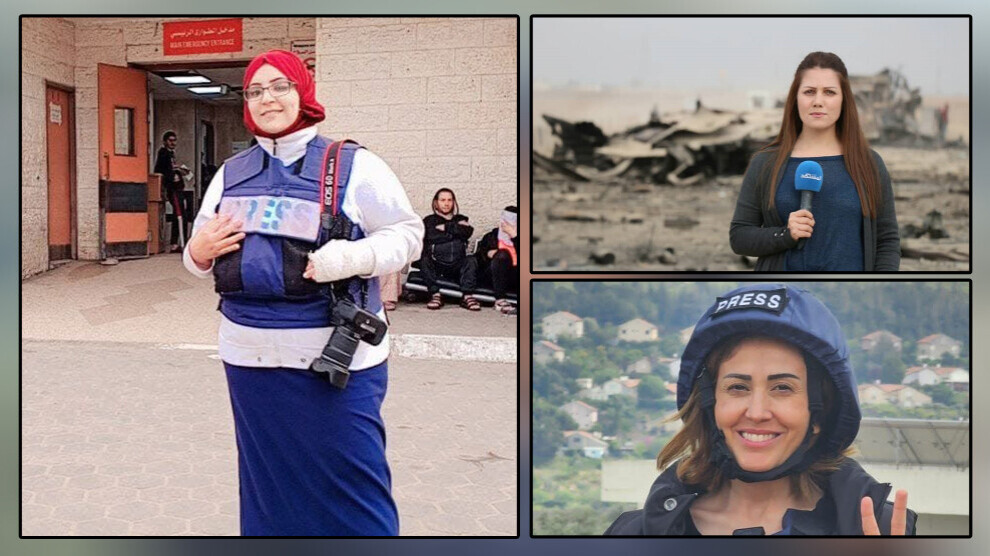Challenges faced by women journalists in Middle East
Safinaz Al-Louh, journalist in the Gaza Strip, Ronak Sheikhi, journalist in northeastern Syria and Amal Khalil, journalist in southern Lebanon, are determined to do journalism despite all the challenges.

FADIA JUMAA
Beirut- Women journalists working in war zones face many challenges, including rights violations. NuJINHA spoke to Safinaz Al-Louh, journalist in the Gaza Strip, Ronak Sheikhi, journalist in northeastern Syria and Amal Khalil, journalist in southern Lebanon, about the challenges faced by them while doing journalism.
‘My brother was also a journalist killed in an Israeli strike’
Safinaz Al-Louh, reporter at Aseel TV in the Gaza Strip, told us that she faced many challenges while doing her profession. “Many journalists have been killed in Israeli attacks on the Gaza Strip,” said Safinaz Al-Louh, whose brother, Ahmed al-Louh, was killed in an Israeli strike in Gaza. “My brother worked as a cameraman for Al Jazeera alongside other media outlets. He was killed in an Israeli strike on Gaza. The Israeli forces target journalists. We often face bombardments and military operations by the Israeli forces.”
’25 women journalists have been killed’
The Gaza Strip has suffered from power outages since the beginning of the war, Safinaz Al-Louh told us. “Since the occupation has divided the Gaza Strip into two, we cannot travel from one area to another. We face difficulties in reporting the truth to the world due to the ongoing internet blackout. Despite all the challenges, I am determined to do journalism and I will do journalism until I die. According to the Government Media Office in Gaza, 198 journalists, including 25 women, have been killed in Israeli attacks on the Gaza Strip since October 7, 2023.”
‘The Turkish state targets journalists and civilians’
The journalists in the region face challenges and risks due to the attacks of the Turkish state and Turkish-backed factions, said Ronak Sheikhi, a journalist based in northeastern Syria. “The Turkish state and Turkish-backed factions violate international conventions and human rights by targeting civilians and journalists. I have covered the attacks of ISIS on many cities, including Manbij. I received many threats at that time. After the region was cleared of ISIS, the Turkish state and Turkish-backed factions intensified their attacks on the region.”
‘I use my camera to make the voice of people heard all around the world’
Ronak Sheikhi is also a mother. Although she receives threats, she keeps doing journalism. “Because journalism is a humanitarian profession and a way to make the voice of people heard all around the world. I keep working despite all the challenges. Everyone knows that the Women's Defense Units (YPJ) defend this region. I use my camera and pen to make the voice of people heard all around the world. On December 19, 2024, two of our colleagues, Cihan Bilgin and Nazım Daştan were killed in a Turkish drone strike. Therefore, we, as journalists, face many challenges and threats and we need international solidarity.”
‘There is no safe place’
Amal Khalil, Lebanese Al Akhbar journalist, has been covering the war in southern Lebanon since October 2023. “As journalists, we face risks; we have lost many of our colleagues. Male and female journalists stayed in southern Lebanon to cover Israeli attacks. Many of them were killed in Israeli attacks. There is no safe place for journalists in war zones.”
She receives threats
Despite all the risks, Amal Khalil is determined to do journalism. “I decided to stay in southern Lebanon because I am not more valuable than the people of southern Lebanon. I have received an Israeli death threat message, urging me to leave southern Lebanon. In the message, they say that they would blow up my house, kill my family members and behead me. When the death message was published by media outlets, I received another death message saying that I would soon pay the price. After the attacks intensified, I had to take many precautions.”
‘My duty is to document war crimes’
Amal Khalil concluded her speech, saying: “I cover how the Israeli forces violate the Israel/Lebanon ceasefire agreement. As journalists, we have witnessed the attacks for more than a year. My duty is to document the war crimes committed in southern Lebanon. We report to the world how Israel violates the ceasefire, international conventions and targets civilians.”
